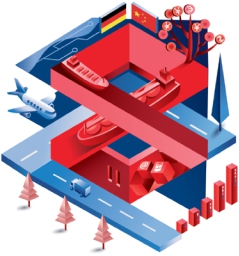HUANG Mengmeng: Withstanding the pressure

MA XUEJING/CHINA DAILY
Although the value-based diplomacy has been put in a more prominent position in Germany's China policy, economic ties between China and Germany remain resilient
Since the 50th anniversary of the establishment of diplomatic relations between China and Germany, Sino-German relations have led the way in Sino-European relations. However, against the backdrop of the Russia-Ukraine conflict, Germany's Zeitenwende, a historic turning point, not only facilitates the transformation of the country's security policy but also exerts an impact on Sino-German relations.
On the one hand, value-based diplomacy has been put in a more prominent position in Germany's China policy. Since President Joe Biden took office, the US has increased its efforts to build an "exclusive" value-based club to contain China. With the influence of the United States, Germany is also attaching growing significance to valuebased diplomacy. Amid the ongoing Russia-Ukraine conflict, inside Germany's coalition government, the Green Party's "value-based diplomacy" approach has been constantly hyping the "democracy versus authoritarianism" narrative. Germany's Ministry for Foreign Affairs, run by the Greens, is also formulating Germany's China Strategy, placing value issues at the center of China-Germany relations.
On the other hand, the German political initiatives to reduce dependence on China have increased. In the wake of the Russia-Ukraine conflict, the effectiveness of "wandel durch handel", meaning change through trade, is being questioned by Germany's politicians, with growing cries for "reducing dependency on China". Germany's Ministry for Economic Cooperation and Development is formulating new trade policies with harder lines on China, such as lowering the government's investment guarantees for German companies looking to invest in China and further expanding the scope of its foreign investment regime to screening Chinese investment in Germany.
Although the Sino-German political relations have undergone challenges in a volatile international environment, Germany's business circles have widely differing views toward China. According to a survey conducted by the Mercator Institute for China Studies, from 2020 to 2022, 77 percent (2020), 63 percent (2021) and 61 percent (2022), respectively, of the surveyed German general public and experts on China policy expect China-Germany economic relations to remain stable or improve.
German companies that operate in China, especially large multinationals, have become increasingly dependent on the Chinese market. According to Handesblatt, Germany's foreign direct investment flows into China accounted for 46 percent of the EU's total FDI flows into China in 2021, an increase from 32 percent in 2019. During the first half of 2022, Germany's FDI in China reached around 10 billion euros ($10.7 billion), a year-on-year increase of 21 percent. The country's three largest car manufacturers Volkswagen, BMW, and Mercedes-Benz, and chemical group BASF account for approximately one-third of the EU's total FDI flows into China.
As a matter of fact, despite the growing political outcry for "reducing dependency on China", German business finds it is difficult to "decouple" from China. Instead, according to the German Chamber of Commerce, 70 percent of German Companies in the Business Confidence Survey 2022/23 have chosen to use a dual strategy to hedge the risks tied to geopolitical tensions. German companies are localizing operations and supply chains inside China, diversifying in Southeast Asia, or simultaneously doing both. And the number of German companies that choose to promote "localization" of production and R&D in China far outweighs the number of those that opt to promote "diversification" of supply chains in Asia.
German businesses cannot afford the cost of "decoupling" from China. As an export-oriented nation, "de-globalization "measures would substantially increase Germany's manufacturing costs and reduce its competitiveness. According to data from the Bavarian Industry Association, the relocation of production back to Germany (reshoring) and to the EU-27 member states, Turkiye, and North Africa (nearshoring) would reduce German GDP by 9.68 percent and 4.17 percent respectively. For the German economy, the negative effects of a trade war between the EU and China would be almost six times higher in terms of German GDP than the costs of Brexit.
Thus, the pragmatic course remains an important recipe for Sino-German relations. Since the launch of reform and opening-up, China has had a coherent policy toward Germany and treats Germany mainly as a partner. First, China has been promoting cooperation with Germany based on respect for its social, economic, and governance systems. Second, China has been deepening economic and technological ties with Germany, by constantly reducing the regulatory hurdles and making efforts to introduce a more transparent legal framework to improve its business environment, introducing Germany's dual system of vocational education, and placing equal emphasis on attracting investment from German large companies and small and medium-sized enterprises, which are regarded as "hidden champions". Third, in the area of global governance, guided by the principle of "Shared responsibility", China has been vigorously bolstering cooperation with Germany in climate action.
Therefore, China and Germany should view bilateral relations from a more rational perspective. When meeting with German Chancellor Olaf Scholz in November, Chinese President Xi Jinping quoted former German chancellor Helmut Schmidt, who said that political leaders should have the serenity to accept the things they cannot change, the courage to change the things they can change, and the wisdom to distinguish between the two.
Scholz also reiterated his position that China's rise does not warrant "isolating Beijing or curbing cooperation" recently in the US Foreign Affairs magazine. Thus, the pragmatic leaders from China and Germany have the willingness and capability to maintain exchanges, reduce misjudgments, and ensure that bilateral ties make sustained progress and achieve long-term goals.
Huang mengmeng,Assistant Research Fellow at the Institute of European Studies, Chinese Academy of Social Sciences.
The article was originally published in China Daily on March 1, 2023. The article has been authorized.
